A Farmer’s Land
I speak a lot these days, about Industrial Wind Turbines, when representing the Concerned Citizens of Branch County coalition.
As such, I often come face to face, with a farmer or two, who has leased their lands to DTE Energy.
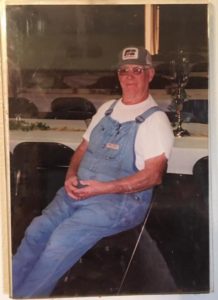
These farmers, with their tanned faces and strong hands, sometimes think we are out to get them — or worse yet, cause them grief. Neither thing is true, but the farmer doesn’t know that. The farmer doesn’t know my heart aches with all the misunderstanding and misinformation out there in the community.
All he knows is that I am some woman from the “Grow Crops — Not Turbines” group. He thinks we are trying to tell him what he can — and can’t do — with HIS land. Who are we, to tell him, to grow crops?
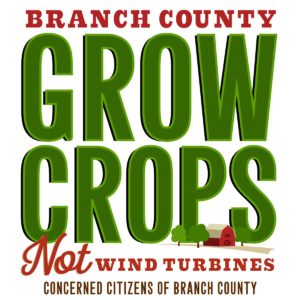
No one wants to be told what they can and can’t do with their land, maybe even more so for a farmer, I imagine. I get it.
Your land is your blood, sweat, prayers and tears. Your land is your life and often your legacy.
So why do farmers bristle when we say, “Grow Crops” on their land?
Does the factory owner in an industrial zone bristle when we say, “Make Widgets”?
Does the homeowner bristle when we stand in a residentially zoned neighborhood and say, “Live Here”?
I am a Farmer’s Granddaughter
My Grandpa was a farmer, as was his father, as was his father’s father — so on and so forth.
My Grandpa didn’t have much schooling — there wasn’t time for that. His time was needed at the farm and he learned what he needed to know from it. He worked hard and saved enough to buy his own 100 acres.
My Grandma worked alongside Grandpa faithfully and they had four boys. When the boys (my dad and my uncles) were too little to work the fields, they sat on a blanket in the field. They were taught to stay on that blanket, sit at the end of the row, and wait for my Grandparents to come back to them.
This picture of my grandparents, dressed in their Sunday best, was taken in 1944 when my dad would have been 5 years old.
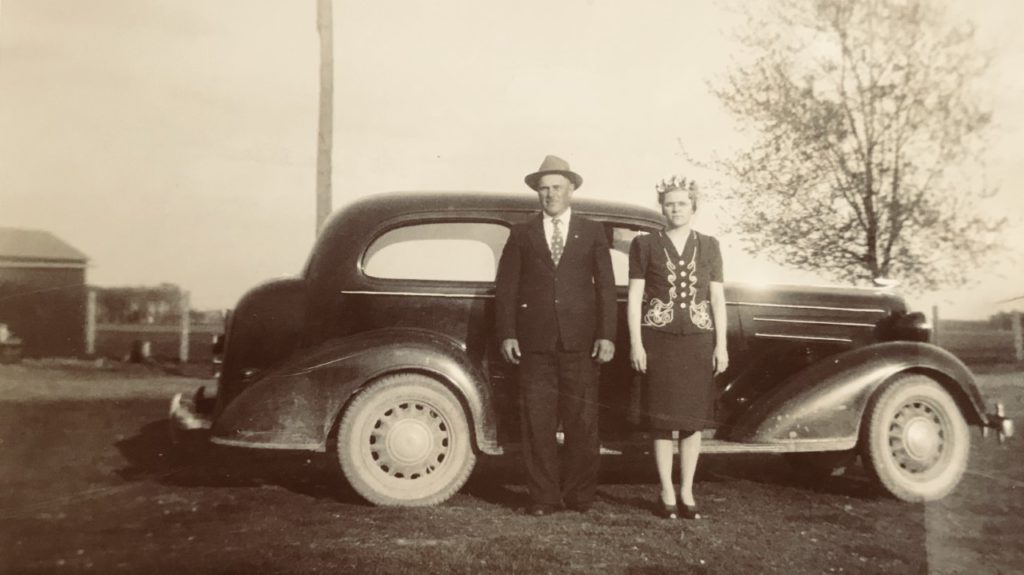
My Grandparents loved music and they taught their boys to harmonize in the fields. They sang hymns while they thinned out rows of sugar beets or tended navy beans. Their piano was one of their few luxuries.
Grandpa didn’t believe in buying “brand new” implements for the farm. He thought it was better to have someone else work out the kinks first.
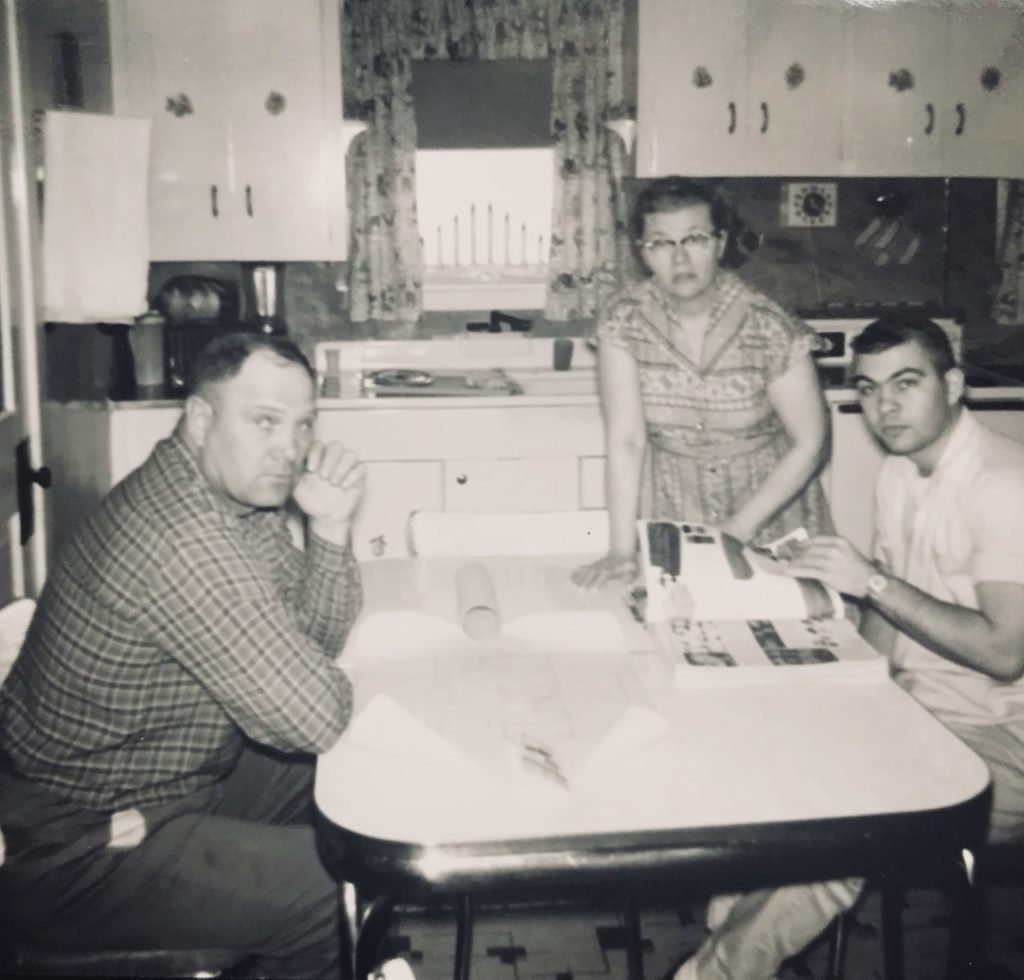
Looking at this picture now, I wonder, how my Grandpa (above left) would he have felt today, if some woman he didn’t even know, talked to his community about incompatible land use on his own land. His own land. I can almost hear his reaction to the very idea — hogwash. I can see his own disbelief in the face of my father. Hogwash.
As hard as it would be to say, I would have to respectfully redirect.
There’s more to it, I would suggest. I mean no disrespect.
Your Rights versus My Rights
We like to think we have the right to do whatever we want with our property.
In actuality, if your lands are governed by zoning, you are already being told what you can do — and can’t do — with your land, but not by me. Your municipality is telling you that — requiring that and then enforcing that. Zoning requires that property owners, big and small, relinquish a portion of their individual property freedoms for the common good of their community.
So how do you respectfully tell a revered, hardworking farmer that he is only allowed to do whatever he is already zoned for? How would I tell my Grandpa that?
Zoning requires relinquishment in order to prevent the mixing of incompatible land uses, which in turn, helps protect property values. Zoning gives the municipality (whether it be a Township, Village, City or County) the autonomy to regulate land use and quality of life for its residents. We can debate whether zoning is a good thing or a bad thing all day long. But the reality of it is: if you have zoning, you cannot do whatever you want with YOUR land.
Hear me out, Grandpa.
If it were true that we could do whatever we wanted to, on our own land, then DTE would have already sited their Industrial Turbines 984 feet from my home — and there would be ZERO need for our Townships to address Turbines through zoning or create Special Use Permit ordinances.
Farmers have the right to farm their land — as they damn well should.
But when DTE leases a portion of a farmer’s land, that portion of land is converted and reclassified as “non-agricultural commercial” or “industrial“, as determined by the Farm Service Agency (FSA) which operates under the United States Department of Agriculture (USDA). Per the FSA and USDA. Think about that — it’s not from some anti-wind organization. Turbines change the nature of the land use.
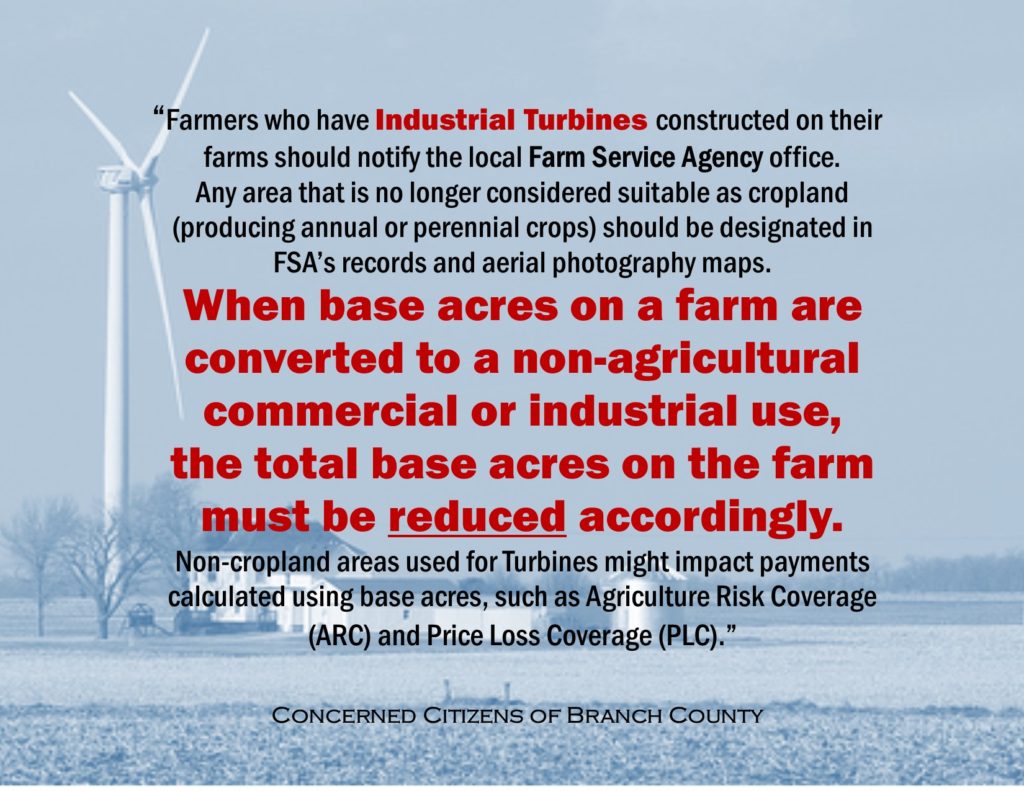
Which in turn, reduces the total base acreage of the farm accordingly. Reclassifying a few base acres, for each Turbine, to the FSA programs may not be a significant financial loss to a farmer — and is outweighed by money paid out by DTE — but that’s not the point. To landowners like me, who live in a zoned municipality, it supports the notion that Industrial Turbines equate to incompatible land use. If you live within a zoned municipality it affords you protection from mixing land use that doesn’t serve the entire community.
Stay with me here.
Neighbors Working Together
When we first bought our little parcel of land, we realized that one of the irrigation systems was pelting the side of one of the our grain barns. Now, the grain barn was in rough shape to begin with, but the cedar siding on the southern side of the barn, that had been sprayed for who knows how many years, was buckled and shredded. We asked our neighbor to come take a look. After seeing what was happening, he kindly reset the irrigation system so that it stopped pelting the barn. Problem solved. Thank you neighbor.
A few years later, a small tree had sprouted up alongside the property line, its limbs reaching out over our neighbor’s fields. This time we we were intruding into their field, as we realized the longest limb was snagging the end sprayer. BJR got busy cutting down that tree and then called our neighbor/farmer so he could check to make sure the end sprayer wasn’t damaged. Problem solved. Thank you neighbor.
Please hear me out.
When a commercial farmer plants seed corn, there is an understanding with neighbors like myself, a gentleman’s agreement if you will: we don’t plant sweet corn in our little hobby garden because it would throw off the pollination of the neighboring, commercial seed corn crop.
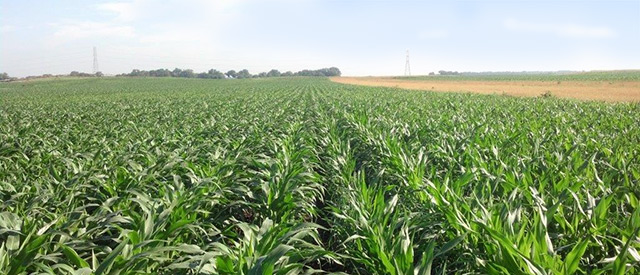
In return, the farmer plants a field of sweet corn — in an entirely different location — and tells his neighbors to go pick and enjoy sweet corn, whenever we want. It’s the farmers way of saying thank you for not doing something on our own land (that we technically have every right to do so) because of what the consequences would mean to his crops on his land. Problem solved. Thank you neighbor.
Neighbors take care of each other. Neighbors look out for each other too. And DTE is no neighbor.
Tenant’s Rights?
Having DTE as my neighbor’s tenant would more than double my ambient noise level, pelt my home with shadow flicker in season — sunrise and sunset — and cast red blinking lights across the horizon at night with every passing aircraft. The DTE lease now specifies they will set their Turbine to avoid the center pivots of the farmer’s leased fields, which is great for the farm operation, but then places the 500-600 feet tall industrial equipment even closer to our property lines. And because DTE would rather site setbacks based on the foundation of my home, instead of the property line, they could end up taking a portion of my land as an uncompensated easement — called trespass zoning if allowed — which equates to then limiting my own land use. Those consequences, just to name a few of them, then mean that Industrial Wind when improperly sited devalues the homes within its footprint.
The reality of Industrial Turbines is that they have more than doubled in size in the last twenty years. They aren’t windmills and they aren’t farming — if they were, the FSA wouldn’t require that portion of land to be reclassified.
The reality is that DTE hires subcontractors who aren’t held accountable for the half-truths they tell or the falsehoods they spin. They have a “nice guy” attorney whose business card says “Site Manager” as his title, yet this sub-contracted attorney with his own law firm specializes in land acquisition. Don’t get me wrong — I appreciate a good attorney as much as the next person. I just like to know when I’m dealing with one.

Subcontractors have knocked on the door of an elderly farmer I know over ten times, even though the farmer told them not to come back. At what point is that harrassment?
Subcontractors are careless with their facts. They have been so careless and haphazard here in Branch County that anyone paying attention has repeatedly heard their contradictions. Yet they keep repeating their falsehoods. One frustrated resident last week, after listening to the DTE representative repeat their lies, said it best when he said, “Do you think we are stupid?”
DTE’s team knocks on doors — once in a while, that door will belong to someone who knows me. That DTE fella isn’t afraid to criticize me as “that woman trained by the anti-wind people.” They claim I am being paid by the oil and gas industry or some nefarious anti-wind lobbying group. (Insert eyeroll.) If I am “trained by anti-wind” because of the videos I have watched on YouTube, then I guess I can add “trained by Bob Villa” and “trained by the Pioneer Woman” to my resume because I watch their videos all the time too.
Oh, don’t mistake my frustrations — I have watched plenty of “pro-wind” presentations on YouTube as well. But here’s the thing: I’ve listened to both sides and decided that like so many other issues in our country today, it’s easy to polarize the issues. Pro-this, anti-that. Make them so divided that they only talk at each other instead of having open dialogue. How’s that working, ‘Merica?
Because after researching and trying to talk to both sides, I have concluded that there has to be more than “pro-wind” and “anti-wind” — there has to be “pro-health” and “pro-resident.” If you can’t sell the product and build it safely within the community, then it doesn’t belong in the community. But companies like DTE do their darndest to divide and conquer.
Those of my people that know me and “bang-bangs” (aka guns) will appreciate this funny: DTE tells people that both BJR and I are retired military (Me personally, a retired soldier too…ha! They obviously have never seen my target after shooting at the range, huh?).
The Wind Developer can say whatever they want about me, because it’s not about me — and they are paid to undermine with whatever means they can.
Because when all you have are diversion tactics and personal attacks, it is what you use — because DTE can’t win if they discuss the reality of Industrial Wind. So they stick with the script and keep sending unscrupulous contractors out into our rural communities to try to get folks to sign over the rights to their land.
That’s really the ironic thing. For the farmers who feel we are trying to tell them what they can and can’t do with their land, I think it’s easier to huff and puff at our Coalition than recognize how much has already been signed away to the “sole discretion” of DTE.
The phrase at the “sole discretion of DTE” is littered throughout the 40 year lease agreement (with a 20 year extension option at the end of the 40 years — yep, you guessed it… at the “sole discretion” of DTE to extend).
DTE can site the turbines at their sole discretion.
DTE can sell to a third party without your consent.
We’ve already heard it from numerous farmers who leased their land — they wish they had never heard of DTE.
One farmer said it best:
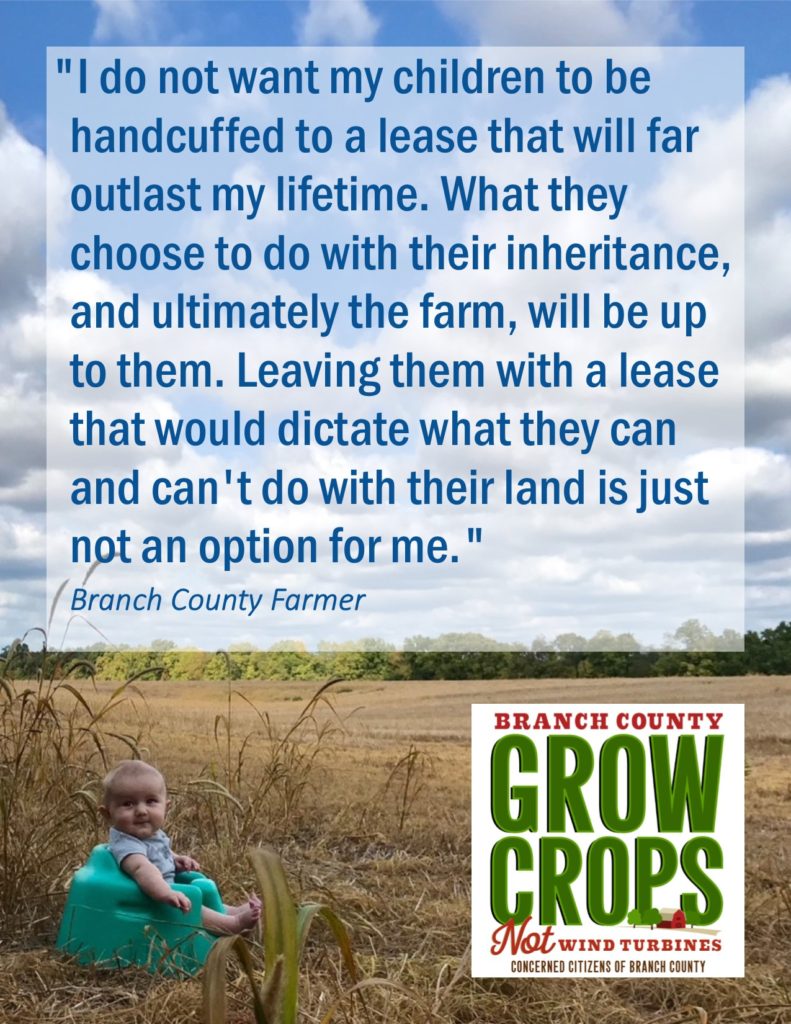
I have concluded, from these cheap seats of this rural peanut gallery, that companies like DTE will never admit that our Coalition has legitimate concerns. Wind Developers will never publicly acknowledge that there must be a “pro-resident” perspective added to the dialogue if they believe their super-sized Turbines to be a required, viable component of renewable energy. Rural residents must have their health, welfare and safety at the forefront of Industrial Wind. Ignoring our concerns damages the credibility and legitimacy of the super-sized Industrial Wind agenda.
Michigan’s Renewable Energy Standard
For those that ask, well what about the Renewable Energy Standard?
Doesn’t that require that Michigan’s electric providers achieve a retail supply of 15 percent by 2021? Let’s talk about that! Take a look!
https://www.michigan.gov/mpsc/0,1607,7-159-16393_53570—,00.html
The RES requires that electric providers achieve a retail supply of 15 percent via renewable energy sources, by 2021, which includes biomass, solar photovoltaics, solar thermal, wind, geothermal, municipal solid waste, landfill gas, existing hydro, tidal, wave and water current.
It doesn’t include anything about improper siting or devaluing the homes of little rural residents like me with those super-sized 500-600′ tall Industrial Wind Turbines.
But most importantly, Section 460.1054 does say this:
Nothing in this subpart abrogates the powers granted to local units of government under the Michigan Zoning Enabling Act.
460.1054 Powers of local units of government under MCL 125.3101 to 125.3702.
Sec. 54. Nothing in this subpart abrogates the powers granted to local units of government under the Michigan zoning enabling act, 2006 PA 110, MCL 125.3101 to 125.3702.
verb
formal
3rd person present: abrogates
-
1. repeal or do away with (a law, right, or formal agreement).“a proposal to abrogate temporarily the right to strike”
synonyms: repeal, revoke, rescind, repudiate, overturn, annul; -
2. evade (a responsibility or duty).“we believe the board is abrogating its responsibilities to its shareholders”
We must always remember that “Townships officials represent the level of government closest and most responsive to the wishes of the people.”
Townships have the right to enforce zoning that promotes the health, welfare and safety of all residents — and renewable energy standards do not negate that. The desire of a utility company to achieve that standard in a way most beneficial to their profit margin should NEVER come at the expense of our rural communities. Period.
So when I think about talking incompatible land use, with a farmer like my Grandpa, I remind myself about that. And about hoping he wouldn’t shoot the messenger. It’s not always easy to say what needs to be said. It’s hard sometimes to put yourself out there. It sure isn’t how I wanted to get to know my community. But I am willing to do what I can, when it needs to be done.
I think — at the end of the day — my Grandpa would have ultimately approved and agreed.
No Wind Developer is going to take care of me or my neighbors.
Utility companies like DTE desire to have their financial benchmarks overtake the safety and wellbeing of rural residents like me.
Time and time again, communities like ours are forced to begin grassroots efforts to protect our homes and wellbeing.
Grassroots grow strong.
Grassroots grow best when residents are willing to toil and do the work.
I know that because, although I may just be one, I am a farmer’s granddaughter and I am willing to do the work.
And BJR and I are blessed to have wonderful good people alongside us as we fight DTE.
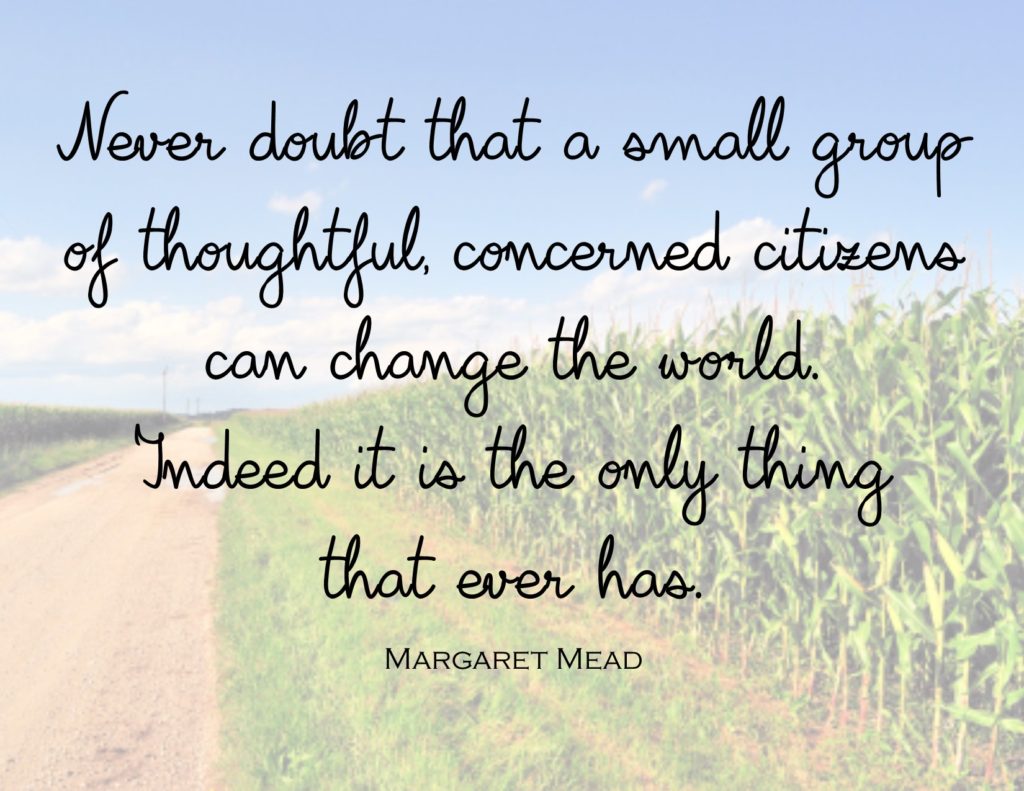
Relationships with good people are the true measure of wealth on this earth.
No company like DTE will ever be wealthy like us in that regard — of this I am certain.
From the Industrial Wind battlefront, love from DRF…
PJR
Thank you for the common sense you’ve so clearly expressed.
Here’s something I wrote three years ago, after my entire river valley neighbourhood was surrounded with turbines. This river valley neighbourhood consists of properties zoned residential, recreational and also agricultural. Some of us have been here more than four decades. None of us are leaseholders. We did not consent to the trespassing of harm caused by noise, infrasound radiation and LFN modulations from these turbines.
Your statement about “pro-health” and “pro-resident” is the stance I’ve taken in my opposition to this injustice from the day the turbines were turned on and I experienced my first physical symptoms. I have spent three and a half years now trying to protect my entire family and my neighbours who live in this otherwise idyllic neighbourhood near the shores of Lake Huron.
My apologies for the length of this response.
Where else in Canada do we have a situation where citizens have no say in changes to their environment that potentially can have adverse health effects? What other subgroup of Canadian citizens are being violated the way rural residents are being violated with the placement of industrial wind turbines close to and in some cases surrounding their homes?
In Canada, we choose the food we eat.
We choose to exercise adequately each day… or not.
We choose whether or not to get adequate sunlight.
We choose the amount of water we drink on a daily basis.
We can even choose the kind of water we drink.
We choose how we will dress ourselves to protect ourselves from the elements.
We choose whether or not to smoke cigarettes or drink alcohol to excess.
We choose whether or not to partake in potentially harmful recreational activities.
We choose whether or not to get adequate sleep on a daily basis.
And yet, residents of rural communities have not been given a choice as to whether or not they will be exposed to distressing noise from turbines that have been placed too close to their homes. They simply have no protection from having their neighbourhood environment turned into an industrial soundscape whenever the wind blows or atmospheric conditions are such that industrial wind turbines make a variety of unnatural, penetrating, pervasive sounds.
Rural residents have been used as subjects of an experiment, where they are being exposed to audible sound and infrasound radiation from industrial wind turbines in close proximity to their homes.
Those who are responsible for our environment and our health in Canada refuse to acknowledge that the noise compliance standards are not adequate when it comes to transforming a quiet countryside soundscape into an industrial power station around homes.
To my knowledge, there is no precedent for this highly unethical, lack of protection for rural residents.
Throughout Canada, employees are protected in the workplace by rigorously upheld safety standards.
Canadian citizens are protected from a myriad of possibly harmful effects as they go about their day to day lives.
Crimes of neglect and abuse are steadily being reported, examined and reduced in Canadian society through legal protection.
And yet we have thousands of rural residents who have pleaded for protection from industrial wind turbines sited too close to their homes…to no avail. These residents have been further violated and distressed by the medical community’s insistence that industrial wind turbines’ audible noise and infrasound radiation, are not causing the health effects being reported anecdotally?
Prescription drugs to ameliorate adverse health effects are not the solution.
Sleeping pills are not the solution for residents who cannot sleep or are woken suddenly from their sleep with traumatic episodes caused by the turbines.
Recommendations of relocation are absolutely unacceptable and will become a legal nightmare if medical people continue such practices.
The logical solution is simple.
Call a halt to any further industrial wind turbines being sited within unsafe distances to rural peoples’ homes.
Network with one another and collectively recommend to the government that turbines that have been placed too close to peoples’ homes be turned off immediately.
If you really believe that industrial scale wind turbines are the way to ‘save the planet’ and that this needs to be done at the expense of rural people in Canada, then I highly suggest that you read the engineers reports on efficacy of industrial wind turbines. It’s in this document“Engineering Expertise Vital to Success of Ontario’s Electricity System: OSPE”, Jan 16, 2013.
Also I suggest spending time getting up to date with the serious scientific arguments against the claim that industrial wind turbines can mitigate climate change. Here’s a place to start:
http://wattsupwiththat.com/2015/03/18/anatomy-of-a-collapsing-climate-paradigm/
Your leadership is desperately needed NOW.